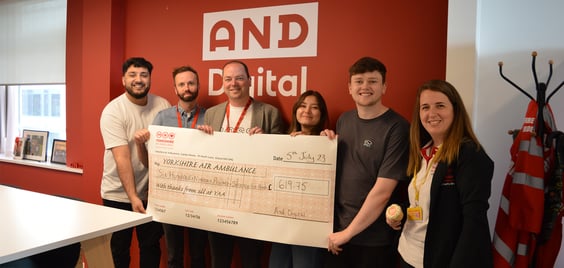Community
Building a neurodiverse workforce: setting everyone up for success
26 November 2021 • 5 min read

Recently, I took part in a neurodiversity training session with a group of colleagues. One particular statistic stood out and has stayed with me: while approximately 20% of the workforce is neurodivergent, only 1 in 10 HR professionals consider neurodiversity in their practices.
There are many similar statistics suggesting that the HR profession is failing to take neurodiverse employees into account.
We can’t overlook this. It’s a major issue and one that we need to take responsibility for addressing. Given the fact that a sizable proportion of the population is neurodiverse, we’re preventing a huge number of people from succeeding at work and making the type of impact that they could if they were supported in the right way. This isn’t only wrong on an individual level, it’s also immensely damaging for businesses. It will ultimately lead to lower job satisfaction and higher turnover, increasing the pressure on businesses that are already struggling to find the talent they need.
However, while the issue is serious, there’s plenty we can do as HR professionals. I’ll discuss some of the things we’ve been doing at AND to make the company more inclusive for neurodiverse people, but first let’s look at what neurodiversity is exactly, and why it matters in the workplace.
What is neurodiversity?
Neurodiversity is the vast range of ways in which brains function. It impacts how people socialise, learn, and even how they feel. The term encompasses a vast range of diagnoses, including ADHD and autism.
While there is no clear definition on precisely what is and isn’t neurodiverse, use of the term is really about recognising that individuals will often have certain preferences about how they want to behave, interact, or solve problems. Embracing neurodiversity, then, is essentially about ensuring that people are empowered to do that, rather than forced into supposedly ‘neurotypical’ ways of living and working.
Why does it matter at work?
From the definition, it should be clear why neurodiversity matters in the workplace. But, to clarify, neurodiversity matters at work because workplaces will invariably have their own set of processes, norms, and ways of working that make particular demands on people. These are usually benign and - to neurotypical people - barely noticeable. But for neurodiverse people they might be very restrictive or difficult to manage and negotiate.
If not acknowledged, this makes it hard for neurodiverse people to do their best work and feel comfortable in the workplace.
What can HR teams do to better support neurodiverse people at work?
HR teams need to advocate for neurodiverse people. As a team responsible for managing employee engagement and satisfaction - as well as recruitment - HR staff can and should be proactive in ensuring the culture and habits of an organisation are inclusive for neurodiverse people.
We’re working hard to do this at AND Digital - while we’re not there yet, by focusing on some practical changes at a number of different touchpoints, we are starting to ensure that AND is a place where neurodiverse people can not only feel comfortable but also succeed and make an impact.
Attracting neurodiverse candidates
It’s easy to overlook, but many organisations get it wrong right at the start of any recruitment process. This means they’re potentially losing out on incredible talent from the neurodivergent community.
Here are some of the things we’ve done to make AND an appealing company to work for for neurodivergent people:
- We’re clear and direct with our messaging and job specs. This minimises ambiguity and stops candidates from ruling themselves out simply because they don’t tick every single box.
- We shout about our communities and ANDIs who are neurodivergent. We give them space to discuss their experience of life at AND Digital.
- We engage with neurodivergent communities including partnering with schools and charities.
- We promote AND roles on accessible job boards used by the neurodivergent community.
- We have dedicated events to celebrate and spotlight the experiences and successes of neurodivergent people.
The application process
Attracting neurodivergent candidates is one thing; but it’s also important that we deliver on the things we talk about in public by making the application process accessible and manageable.
- We make sure our careers site and job specs are accessible to everyone by seriously considering things like colour, text size, and audio options.
- We make it easy for candidates to tell us about any additional needs by asking them at every stage of the process, explain what the typical process is and give examples of what we can adapt. Research has shown that having a named person to contact about any additional needs rather than a standard inbox means people are more likely to disclose.
- We ask clear, succinct questions and always focus on the skills needed for the job.
There are also a number of things we do in terms of interviews:
- We create maps to the office with landmarks and photographs to take some of the stress out of finding us. (I definitely need this!)
- We share interview questions ahead of time to allow candidates to prepare their answers - interviews aren’t a memory test and it can be difficult for some people to remember multiple-part interview questions or give their best answers on the spot. Also allow the candidate time to process any questions you ask.
- We offer neurodiversity training to everyone. This is particularly important for Hiring Managers as it helps them to understand different people's needs and discover what they can do to make the hiring process as neurodivergent-friendly as possible.
- We share a picture and profile of the Hiring Managers with candidates ahead of time so they know who they are meeting.
- We remember that eye contact and body language is not always a sign of lack of interest.
- We consider the interview environment taking care to avoid any unnecessary distractions or sensory overload. Some candidates may be more comfortable with remote interviews in their own space so offer this as an option if possible.
Once an offer has been made and accepted we have ensured that the transition into a new role is as supportive as possible and once the candidate has landed into a club the support doesn't stop there!
Becky O'Farrell is a Senior Tech Recruiter at AND Digital.



